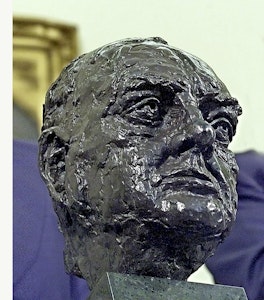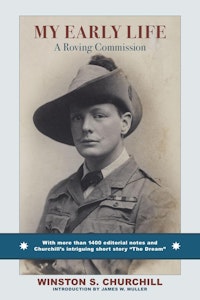This article is taken from the April 2025 issue of The Critic. To get the full magazine why not subscribe? Right now we’re offering five issues for just £10.
Winston Churchill is never far from the thoughts of those who love liberty, but England has seldom had need of him more than now. Our great wartime ally is now seemingly spoiling for a fight, not with oriental despotisms, but with Europe and the English-speaking peoples. Churchill, proudly half-American, would have been mortified by the present administration’s dismemberment of the Atlantic alliance that he did more than anyone else to forge.
On his first visit to the White House, the Prime Minister told the President that “it was so good to see the bust of Winston Churchill back in its rightful place”. (The White House sculpture is by Jacob Epstein — not as good a likeness as that by Oscar Nemon in the Commons.) A pity that, of all the 46 Presidents, the one who (twice) restored Churchill’s effigy to the Oval Office had to be Donald Trump.
His death was not just the end of an era, but the beginning of a more ignorant and ignoble one
Not that Sir Keir is above reproach on this subject. On taking office, Labour quickly removed several images of Churchill from the Palace of Westminster. The present Chancellor of the Exchequer, Rachel Reeves, unceremoniously ejected a fine portrait by Ambrose McEvoy, painted in 1919, from her state dining room. Churchill entered the Treasury, his father’s old office, a century ago, but there have always been portraits of this and other ex-Chancellors lining the walls of 11 Downing Street — until now.
In such dire circumstances, it is especially welcome to have a new annotated edition of the most popular and sparkling of all the great man’s books, My Early Life, under the auspices of an American scholar, the incomparable James W. Muller. Following Professor Muller’s editorial triumph in restoring the original text of The River War, Churchill’s monumental account of the Sudan campaign, the present volume is a less gargantuan but no less worthwhile enterprise.
Well over 1,400 footnotes, as elegant as they are erudite, add hugely not only to the historical importance of this memoir, but also to its entertainment value. A useful editor’s introduction complements his apparatus and, for good measure, he includes not only the author’s preface to the 1939 American edition, but also an additional introduction by the then “First Lady of American journalism”, Dorothy Thompson.

These ephemera capture the brief period when Churchill had been recalled to the Admiralty after the outbreak of war, but was not yet as familiar to readers in the still neutral United States as he would shortly become. And so Miss Thompson, the ex-wife of the novelist Sinclair Lewis, gave this “doubtful democrat”, “political maverick” and “viveur” her endorsement, on the grounds that his critique of appeasement had been vindicated.
My Early Life was not only an instant bestseller but a classic from its first publication in 1930. We learn from Professor Muller that Churchill reordered his narrative according to aesthetic rather than strictly factual requirements. For example, the beginning of his political career, his unsuccessful parliamentary candidacy in Oldham, is placed after his first military service in India and Sudan — when in reality the sequence of events was reversed.
Curiously, in the official (and posthumous) biography, his son Randolph followed this fictional chronology — a testimony to the suggestive power of the father’s narrative. His daughter Mary thought that he had simply muddled up the dates; Muller doesn’t buy that. He thinks Churchill deliberately postponed the account of his entry into politics until after his military service in order to placate his critics, especially his brother officers, who thought the young man too bumptious.
The accusation of self-importance was a recurrent one throughout Churchill’s life and he was obviously aware of it. Even Arthur Balfour, who emerges from these pages as a kindly, encouraging figure, described his earlier book on the Great War, The World Crisis, as “Winston’s brilliant autobiography, disguised as a history of the universe”.
Hence Muller sees the by now mature statesman’s “poetic postponement of his political ambition” in My Early Life as taking a pardonable liberty with the facts in order not to seem overambitious. Wryly, Muller adds: “But I dare say he was impenitent.”
In this, the professor is surely correct. For the main purpose of the book — apart from relaunching his career at a time when he was out of office and making money, of which he could never have enough — was to rally the young and spur them on to nobler aspirations. The generation after the bloodletting of the First World War was risk-averse to a fault. These were the undergraduates who voted at the Oxford Union that they would not fight for King and Country — the notorious motion that led Hitler to suppose that the British were too decadent to resist his encroachments.
Long before the “gathering storm” of the late 1930s, Churchill was urging the flappers and playboys of the Roaring Twenties to forget their fripperies and seize the day. It is worth quoting this passage at length:
Come on now all you young men, all over the world. You are needed more than ever now to fill the gap of a generation shorn by the War. You have not an hour to lose. You must take your places in life’s fighting line. Twenty to twenty-five! These are the years! Don’t be content with things as they are. ‘The earth is yours and the fulness thereof.’ Enter upon your inheritance, accept your responsibilities. Raise the glorious flags again, advance them upon new enemies, who constantly gather upon the front of the human army, and have only to be assaulted to be overthrown. Don’t take No for an answer. Never submit to failure. Do not be fobbed off with mere personal success or acceptance. You will make all kinds of mistakes; but as long as you are generous and true, and also fierce, you cannot hurt the world or even seriously distress her. She was made to be wooed and won by youth. She has lived and thrived only by repeated subjugations.
The concluding image of young males “subjugating” a feminised world could hardly be more shocking to our sensibilities. Yet context is all. Is there not something magnificent about Churchill’s appeal, embedded as it was in his story of an early manhood displaying almost superhuman fortitude and a preternatural instinct for action this day?
Churchill begins with his first memories in the household of his ducal grandfather, then Lord-Lieutenant of Ireland. One is struck by his hero-worship from afar of his father, the “Tory Democrat” Lord Randolph Churchill, and of his American mother, Jennie, who “shone for me like the Evening Star”. His first political recollection is of the death of Lord Beaconsfield, his grandfather’s boss, “whom everyone called ‘Dizzy’”.
In much the same way, my own earliest clear memory of a public event was the death of Churchill himself in 1965. We heard the “bulletins” on the BBC with a sense of mounting dread. At Mass one freezing Sunday in January, our parish priest asked us to pray for Sir Winston. He had died that morning.

It was not just the end of an era, but the beginning of a more ignorant and ignoble one. In his absence, many people felt as Burke did after the ravages of the Revolution: “The Age of Chivalry is gone. That of sophisters, economists, and calculators has succeeded; and the glory of Europe is extinguished for ever.”
Even 60 years after his death, Churchill’s political romanticism has the power to inspire us. My Early Life is, first and foremost, a tale of courage and adventure: of the “roving commission” to seek glory that the young Winston gave himself, spurred on by his father’s death in 1895, when he was 21.
This edition includes as an appendix Churchill’s 1947 short story The Dream, in which he is visited by Lord Randolph’s ghost and must recount all that has happened in the intervening years. This remarkable pièce d’occasion is filled with regrets and foreboding, but also wit. On the subject of female suffrage:
“You don’t allow [women] in the House of Commons?’ he inquired.
‘Oh, yes. Some of them have even been Ministers. There are not many of them. They have found their level.’
It is not given to every young man in his twenties to fight in four wars across three continents, to ride in the British Army’s last cavalry charge at Omdurman and become England’s most sought-after war correspondent, to be taken prisoner and escape from Boer captivity, to write half a dozen books and win the Nobel Prize for Literature, and be elected to Parliament.
This is certainly not a rags to riches story. Though he started adult life by taking the soldier’s shilling, Lieutenant Churchill came close to inheriting a dukedom — and by the time he was sent to report on the Boer War, the Morning Post paid him the equivalent of £25,000 a month.
Today’s online influencers may identify with this meteoric phenomenon. His fame as a statesman began as a subaltern. But he didn’t become famous for being famous. Churchill was more than just a celebrity: he was a hero. What Dorothy Thompson wrote in 1939, just before his and our finest hour, is still true: “It would be impossible to imagine England without him.”







